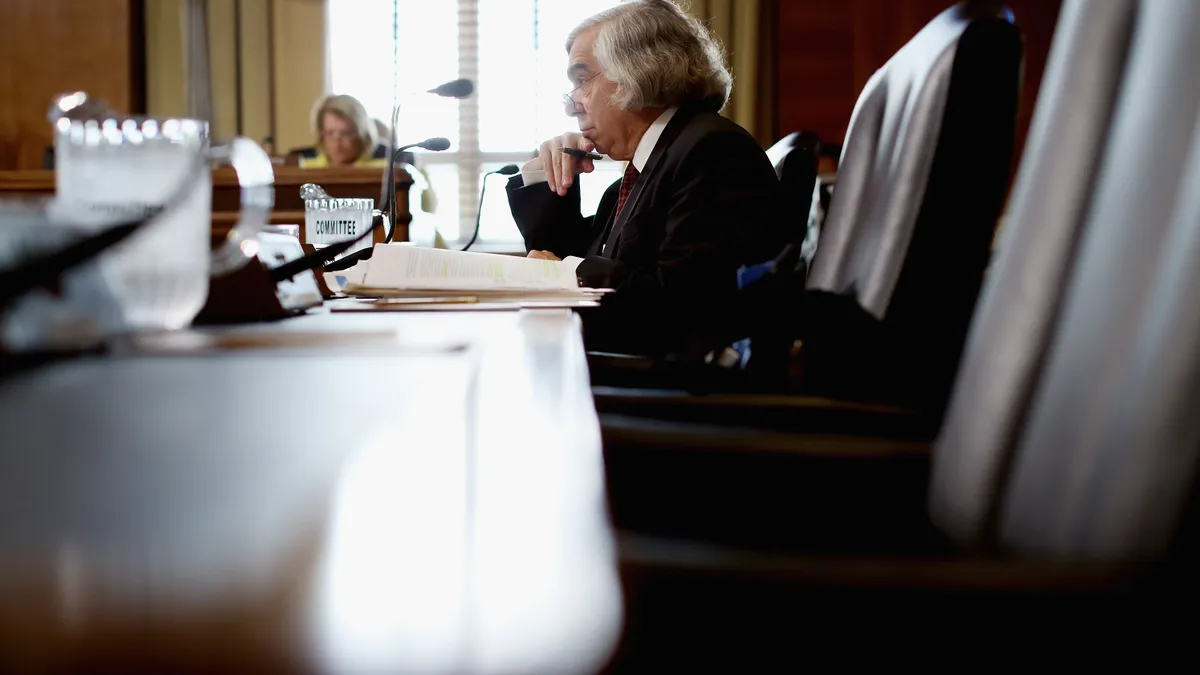Dive Brief:
- Former Secretary of Energy Ernest Moniz on Thursday said he was not surprised by a ruling from federal energy regulators to reject a coal and nuclear subsidy proposal from the Department of Energy, saying there was "no identification of a public good that merited putting the extra cost on the system."
- Moniz, appointed by President Obama at the start of his second term, said the DOE failed to prove to regulators on the Federal Energy Regulatory Commission that its cost recovery proposal would enhance the resilience of the power system. The grid's performance during a recent cold snap "kind of gave the answer" to regulators, he added.
- Moniz said he remains concerned about the retirement of nuclear plants, a major contributor of zero-carbon generation. He lauded state efforts to support the plants, saying they should aim to move from policies that support specific technologies, like renewable portfolio standards, to broader zero-carbon policies that include nuclear.
Dive Insight:
Moniz, who headed the Department of Energy from 2013 to 2017, was previously a nuclear physicist at the Massachusetts Institute of Technology. In a familiar academic fashion, Moniz told Utility Dive Thursday he initially was open to arguments from Energy Secretary Rick Perry that his plan to subsidize plants with a 90-day fuel supply would make the power system more secure.
"I have to say that I was not convinced when I heard it initially, but I was prepared to listen to what FERC said," Moniz told Utility Dive. "FERC answered and they said they don't see it."
Recent grid conditions in the Northeast reinforced that point, Moniz said. In the days before FERC's decision, ISO-New England weathered an extended cold snap even when a major nuclear plant went offline.
"Nature kind of gave the answer by having a recent polar vortex and the grid, including of course fuel substitution to address it, handled it perfectly fine," Moniz said. "So I think there was no identification of a public good that merited putting the extra cost on the system."
Moniz's comments came after a discussion on international nuclear tensions at the Center for Strategic and International Studies. While his current work as the CEO of the Nuclear Threat Initiative focuses largely on these international security issues, he remains concerned about the retirement of nuclear plants in the U.S.
"I'm very concerned about the existing nuclear plants going offline and the carbon impacts," he said. "I think the states that are effectively moving from a renewables standard to a zero-carbon standard — Illinois, New York and maybe Ohio — I think that is fundamentally the right way to go."
Illinois and New York each have subsidy policies for nuclear plants based on their carbon-free generation. Similar programs are under discussion in Ohio, New Jersey, Connecticut and Pennsylvania, though the existing programs are the subject of federal court challenges from the owners of other power plants.
Without commenting on the specifics of those programs, Moniz broadly endorsed a move toward technology-neutral energy policies, such as carbon pricing or including nuclear energy in state mandate programs.
"I think that policies should not be aimed at a particular technology so much as a particular public good," he said. "If it's zero-emissions power you want, whatever you do it should be for zero-emissions power and not single out wind or solar."
"I'm not saying that because I prefer nuclear — I don't — but frankly I think proper policy should not be technology-specific," Moniz said, adding that such policies would be his focus if he was still leading DOE.
"I'd be working on a carbon charge," he said.













